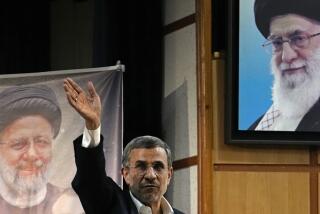Egypt’s Muslim Brotherhood chooses presidential candidate
CAIRO — The Muslim Brotherhood chose a religiously conservative businessman as its presidential candidate Saturday, a provocative move expected to upset liberals and deepen the ruling military’s suspicion over the growing political power of Islamists in Egypt.
Khairat Shater, who was jailed for years under former President Hosni Mubarak, was selected after weeks of debate over whether the organization should field a candidate in the May election. The Brotherhood, which controls the parliament, had long promised not to run a contender to allay public fear that Islamists would dominate the government.
But sensing a chance to consolidate its power after 84 years as the country’s most oppressed opposition group, the Brotherhood reversed course and put forward Shater, the group’s deputy leader. Because of the Brotherhood’s grass-roots popularity, the decision may well mean that in less than two months he could replace the man who tormented him.
The decision came amid a widening internal rift and the concern of many members, especially the young, that the Brotherhood was jeopardizing its credibility by breaking its promise at the risk of alienating non-Muslims and liberals.
The organization’s leaders met last week with the nation’s ruling military council, but it was uncertain whether the generals approved of Shater. The two sides had been cooperating, but tension between them has deepened as the Brotherhood’s Freedom and Justice Party has become more adamant against an army maneuvering to protect its authority before the election.
Shater’s nomination symbolizes the change in political fortunes that have defined the nation since the fall of Mubarak. A husky man with a graying beard, Shater, a multimillionaire, helped finance the Brotherhood by running his businesses from a prison cell. He has emerged as the group’s most solid, if uncharismatic, personality.
The rise of the Islamists — led by the Brotherhood and including ultraconservative Salafis — has alarmed liberals and Christians. The Brotherhood controls the panel drafting Egypt’s new constitution, which secularists and human rights groups fear will be more firmly rooted in sharia, or Islamic law. Liberal members of parliament have boycotted the panel.
The question is, how will the military, which has promised to hand power to a civilian government in June, regard Shater?
“The Brotherhood has a long history of striking deals with government authorities,” said Ammar Ali Hassan, director of the Middle East Center for Strategic Studies. “A deal with the military is now likely. The Brotherhood and the military have differences in long-term strategy, but on current tactics both sides are using the other. There could be an agreement on Shater.
“If there is no deal, however, this means the Brotherhood is throwing down its last card and launching an open conflict with the army.”
Shater’s nomination reflects the growing fissures within the Brotherhood. The group has long had ideological divisions over mixing its religious and political ambitions but it appears much less cohesive under its newfound power. Many members complain that the group’s old guard is too restrictive on its members even as it promises to lead the country toward democracy
The Brotherhood’s leadership is worried that its disgruntled ranks may support other top Islamic candidates, including Abdel Moneim Aboul Fotouh, a former Brotherhood member, and Hazem Salah abu Ismail, an ultraconservative with a populist flair.
Amro Hassan of The Times’ Cairo bureau contributed to this report.
More to Read
Sign up for Essential California
The most important California stories and recommendations in your inbox every morning.
You may occasionally receive promotional content from the Los Angeles Times.











